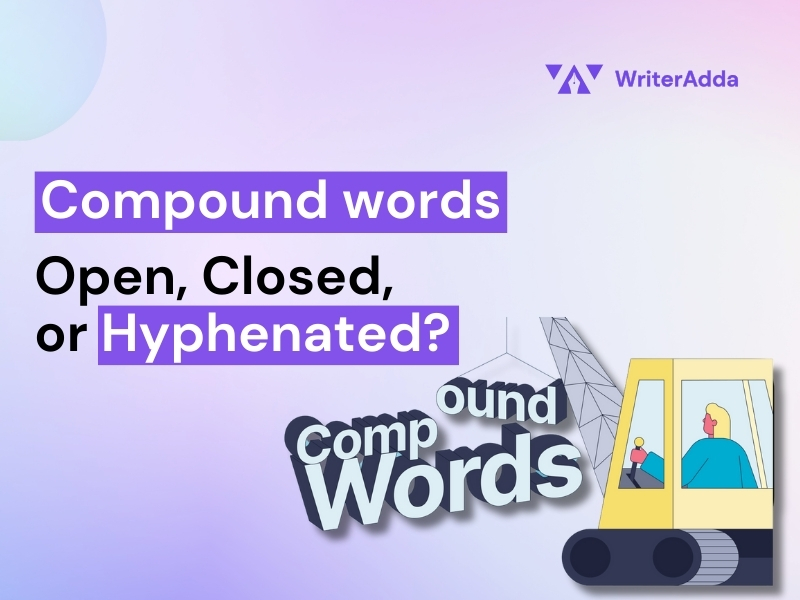The realm of compound words is a fascinating one, so welcome! This blog post is for you if you’ve ever pondered how specific words combine to create an entirely new meaning. The English language relies heavily on compound words because they provide us the freedom to express ourselves in original and imaginative ways. The catch, though, is that not all compound words are made equally. Some of them have an open, some a closed, and some have a hyphen in between. Let’s begin this linguistic journey by learning about the various kinds of compound words and when to use each one. Get ready to discover the hidden meanings behind these word combinations, which liven up and diversify our daily interactions.
What are compound words?
The English language’s compound words are like to puzzle pieces that fit together to form new words with unique meanings. Whether they are nouns, verbs, adjectives, or even other compound words, they are created by combining two or more distinct words.
Open compound words, closed compound words, and hyphenated compound words are the three basic varieties of these word combinations. Each kind has specific usage and spelling guidelines.
Before we delve into the different types of compound words, let’s first define what they are. A compound word is formed when two or more base words are combined to create a new word with a new meaning. These base words can be nouns, verbs, adjectives, or even other compound words.
Examples:
Noun + Noun: Breakfast + Cereal = Breakfast cereal
Verb + Noun: Swim + Suit = Swimsuit
Adjective + Noun: Full + Time = Full-time
Adverb + Adjective: High + Tech = High-tech
Compound Words:
An open compound word is created by joining two words together without any spaces, hyphens or other punctuation. They are usually written as one word, but in some cases, a space may be used to create emphasis or clarity.
Examples:
- Bedroom
- Bookworm
- Firetruck
Open compound words are made up of two distinct but related terms that are written as individual words without any punctuation or spaces in between.
Examples include “ice cream,” “high school,” and “sunflower.” While communicating a combined meaning, these compounds nonetheless maintain their individual identities.
Open compound words are commonly used in everyday language and tend to be more informal. In many cases, the two words can also stand on their own without altering the meaning. For example, “fire” and “truck” are both words with their own individual meanings, but when combined, they create a new word that refers to a specific type of vehicle used for firefighting.
Closed Compound Words:
In contrast to open compound words, closed compound words are written as one word without any spaces or punctuation. These words are created by combining two or more base words that have become so closely related in meaning that they are now considered a single word.
Examples:
- Sunflower
- Keyboard
- Outrageous
Closed compound words don’t have any spaces between the elements they combine. Together, they have a different meaning altogether.
“Notebook,” “sunset,” and “football” are a few typical instances of closed compounds.
Closed compound words can be formed from various parts of speech and often have a more formal tone compared to open compounds. They also tend to be more specific, as they refer to something unique and distinct rather than a general concept.
Hyphenated Compound Words:
As the name suggests, hyphenated compound words are created by joining two or more words together with a hyphen. They can be formed from different parts of speech and often combine open and closed compounds.
Examples:
- Self-esteem
- Mother-in-law
- Well-known
Hyphenated compound words are used to create clarity and avoid confusion, especially when the base words are commonly used on their own. They can also be used to create a distinct meaning that is different from the individual words. For instance, “well-known” has a different meaning compared to “well known.”
Compound words with hyphens between their two independent pieces have a somewhat different structure. This preserves the components’ original meanings while assisting in the clarification of the relationship between them.
For writing to be effective, it is essential to know when to utilize each form of compound word.
Open compound words are frequently employed to describe abstract thoughts or general concepts.
Closed compounds are frequently used for particular things or acts that over time have come to be understood as a single unit.
Hyphenated compounds are useful when there is a need for clarity because of potential ambiguity.
Conclusion
Effective English communication requires an understanding of the many kinds of compound words and when to use them. It doesn’t matter if it’s an open compound word like “ice cream,” a closed compound word like “firefighter,” or a hyphenated compound word like “well-being,” each form has its own norms.
Context, clarity, and consistency with your writing style should all be taken into account when choosing the sort of compound term to utilize. Open compounds can frequently be written as separate words or as a single word depending on desire or a style guide, making them more versatile in terms of usage.




